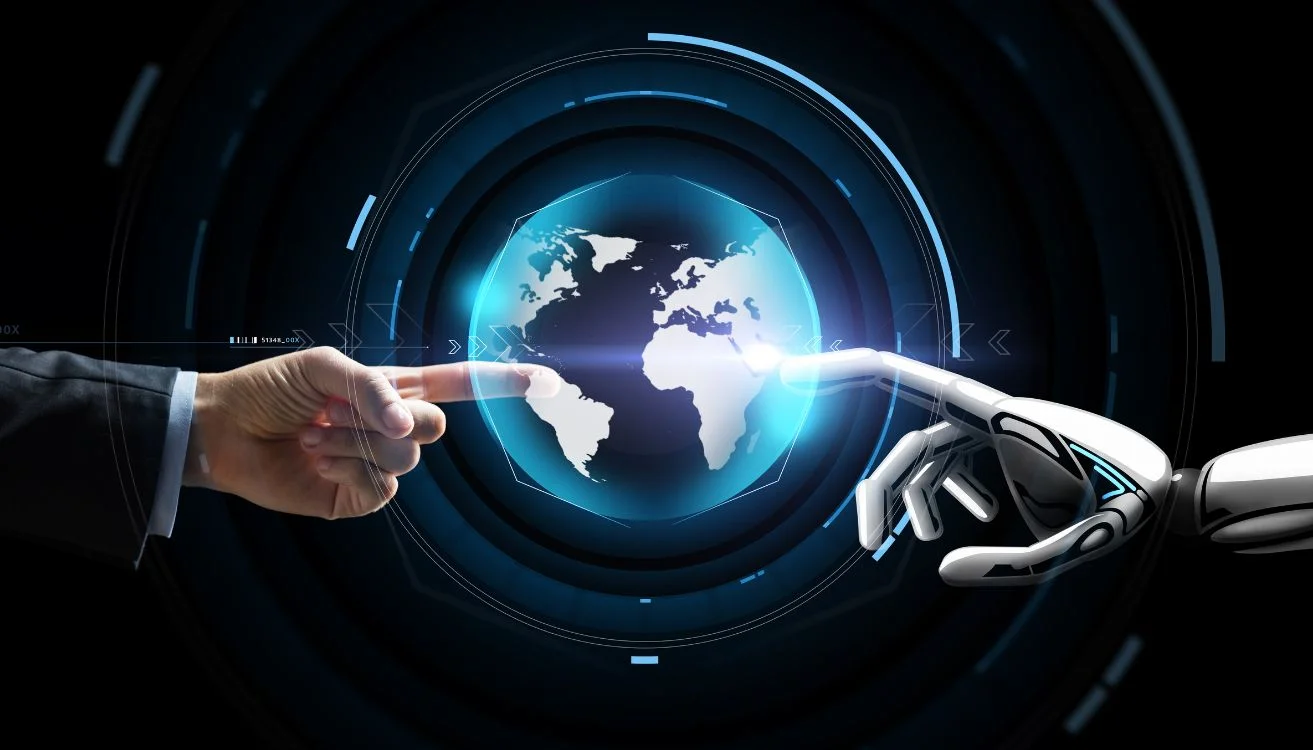
Artificial intelligence in HR? Evaluating the advantages and risks

All industries are discussing the use of artificial intelligence. But what role does it play in HR? What does it help with, and what should we approach cautiously?
The portal Podnikatel.cz presents a study on the use of artificial intelligence in recruiting and HR in general and advises on how to approach this technology.
Daily Use of AI
Surveyed companies reported that they use artificial intelligence in their work. As confirmed by František Budný, the director of the recruitment agency Předvýběr.CZ, the agency has been using artificial intelligence to find suitable candidates since the summer and has achieved better results due to its implementation.
Natalie Štěpanková, a marketing manager at Trenkwalder company, also mentioned that they use artificial intelligence in their work to automate repetitive tasks, analyze information quickly and efficiently, identify trends and patterns, and optimize processes related to hiring and selecting the right candidates.
At mBlue, the use of artificial intelligence is supported. Some employees use it on a daily basis, while others use it for episodic assistance. The reason why the management encourages the use of modern technologies in the company is to increase productivity and improve decision-making processes. Thanks to the more efficient processing of administrative data, the company has the opportunity to give more personal attention to candidates. Managers have more time for their team members and their development, explained Tereza Zilbernaglova, head of the partner personnel department at mBlue.
Josef Kadlec, the founder and CEO of Recruitment Academy, views the tools and functions of artificial intelligence in the same way as email or functions in Excel.
What specifically does AI assist with?
Josef Kadlec clarifies that AI helps him, for example, write posts and comments on LinkedIn—both in creating general formulations and in checking for errors, translating, or rephrasing messages for other platforms. He also used AI to create illustrations for his new book on artificial intelligence.
Pluxee (formerly Sodexo Benefits) uses AI for text composition, graphic development and visualization, data processing, programming, and template preparation for client and user communication. This allows them to work more efficiently and quickly.
“One of the most popular artificial intelligence tools in our company are ChatGPT, Midjourney, and Quillbot. But we are gradually adding and testing other ones as well,” said Martina Mahova, the HR director at Pluxee.
For example, Petr Brichcin, the managing director of the HR consulting company TCC, uses AI in conjunction with virtual reality glasses to train communication and presentation skills. They allow for the instant analysis and evaluation of selected parameters (non-verbal communication, frequency and types of filler words, pace of speech, etc.). A human expert’s evaluation takes much longer and is not as precise, he notes.
Tereza Zilbernaglova explains that they mainly use AI to simplify routine tasks, ranging from personnel management and recruitment to processing relevant data and analysis. Most of their employees use AI tools to speed up the preparation of job advertisements, preparations for interviews with candidates, obtaining information about job openings, and faster and automatic processing of interview records. The use of automated transcription and subsequent creation of comprehensive meeting notes is also a significant support. Equally popular are tools that act as “whisperers” when writing standard emails or applications to adjust ambient noise during phone calls, she adds.
How does AI manifest itself in recruiting?
Jiří Halbštát, a recruitment and marketing manager at ManpowerGroup, explains that AI can provide a more sophisticated, structured selection of candidates based on clear criteria, while most HR managers tend to select employees based on emotions, i.e., primarily on their impressions from the interview.
Furthermore, AI can help automate the evaluation based on specific criteria and skills, reducing the likelihood of selecting an unsuitable candidate for the position or eliminating personal preferences and discrimination. Algorithms can be designed to ignore personal qualities such as gender, race, or age and make decisions based solely on relevant skills and qualifications.
AI can analyze data about current and former employees and use it to predict the success of new hires. This increases the likelihood that companies will find candidates who will be successful in their positions, he adds.
Jiří also mentions that AI can be used at all stages of the recruitment process to write attractive job advertisements that recruiters may not be very skilled at crafting, as well as for finding and identifying talents and moving on to assessment and selection.
Moreover, AI is often used to create chatbots and virtual assistants that can interact with candidates and provide information about open positions. Researchers are developing video analytics tools that analyze a candidate’s speech and facial expressions to generate a psychological profile. For example, this could be analyzing a recorded video interview, he adds.
Versatile Uses of AI in Recruiting
Trenkwalder’s IT department head, Simona Koperová, outlines the diverse applications of artificial intelligence in recruitment. AI can pinpoint suitable candidates through skill and experience analysis, scrutinize social media behaviors to find potential applicants, or even automate preliminary recruitment phases with chatbots.
Streamlining recruitment with AI
Martina Mahova elaborates on how AI streamlines the recruitment process, from initial resume screenings to candidate searches on social media. She highlights the potential of AI to manage the entire selection process, conducting interviews via video call.
AI’s Role in Recruitment Facilitation
Tereza Zilbernaglova identifies key recruitment aspects where AI offers simplification, including advertising, candidate engagement, screening, data analysis, and written communication.
Enhancing Communication with AI Tools
AI’s capability extends to drafting various professional emails, catering to specific styles and content needs. This adaptability is particularly beneficial for crafting thank-you notes, interview invites, and job offers.
Comprehensive AI integration in recruitment
Josef Kadlec discusses AI’s integration across the recruitment spectrum, from job description formulation to candidate engagement and evaluation. He underscores the utility of language models like ChatGPT, Gemini, or Claude in generating tailored interview questions.
AI-Enhanced Interview Documentation
Advances in AI-powered speech transcription facilitate automatic note-taking during interviews, with tools like Metaview and MS Teams’ Intelligence Recap enhancing efficiency and accuracy in candidate evaluation.
Caution Required: Data Protection in AI Operations
When integrating AI into business processes, it’s crucial to prioritize data confidentiality and protection. As AI processes vast amounts of personal information, ensuring the security of this data and the ethical, responsible use of AI is paramount.
Another critical aspect is the transparency of AI systems. Understanding the decision-making process of AI is essential. This highlights the importance of verifying the information provided by AI. It’s imperative not to blindly trust AI outputs without independent validation.
Cybersecurity is another vital concern. With the increasing use of AI, the risk of cyberattacks grows. Protecting systems against unauthorized access is crucial for safeguarding both the data and the functionality of the AI.
Starting AI integration in company operations
Trenkwalder advises companies considering the adoption of AI in HR functions to first conduct a thorough analysis of their needs and capabilities. It’s crucial to identify the specific problems you aim to solve with AI and assess whether you have the necessary resources and expertise for successful implementation. Remembering the ethical and legal aspects associated with AI use in human resource management is also vital, says Simona Koperová.
František Boudný encourages companies not to delay AI adoption, comparing its emergence to the advent of the internet, mobile communication, or cloud technologies and applications.
AI is a technology that simplifies work, saves time, enhances efficiency, and, consequently, increases profitability.
The earlier a company starts working with AI, the more benefits it can reap, he believes. For the generations entering the workforce, AI is a normal part of life. Integrating AI into processes like employee onboarding or professional development will become a matter of course, adds Petr Brichčín.
Gradual AI implementation in HR processes
Tereza Zilbernaglova recommends that companies hesitant to implement AI in their HR processes should start with small, well-defined projects. These projects allow for tracking progress and clearly understanding the benefits.
“Using artificial intelligence isn’t entirely natural for us, and it remains just a tool. It’s only as good as its users. Mastering and working with these tools is a completely new skill that we need to learn. It’s a gradual learning process, similar to learning how to ride a bicycle. We must acknowledge that mastering this skill takes time and doesn’t always yield expected results immediately,” she emphasizes.
According to Martina Mahova, companies should view AI as a tool and assistant designed to simplify work processes. Artificial intelligence can ease companies’ burden of working with information and data and can replace some professions, especially those requiring routine tasks or high precision.
“You can start with assistance in writing job ads or questions for candidates. Gradually try each tool and discover new ones,” she advises.
AI’s limitations in replacing human employees
Simona Koperová highlights the limitations and risks when implementing AI in HR, such as data distortion, algorithmic opacity, potential discrimination, and a lack of understanding of human factors. She emphasizes the importance of mitigating these risks and regularly monitoring the AI systems’ performance and behavior.
Petr Brichčín acknowledges the numerous risks associated with AI, advising always to verify the information it provides, noting that tools like ChatGPT can often distort facts. He stresses that common sense, not mere reliance on technology, should guide its application.
František Boudný views AI’s integration similarly to any other technology or human endeavor, emphasizing the need for clear process documentation to understand roles and responsibilities. He notes that some individuals might feel uncomfortable working alongside machines.
However, he believes it’s crucial not to overestimate AI, asserting that it cannot fully replace human capabilities.
“AI will never be able to replicate certain aspects of human work, such as interpersonal relationships, emotional experience and expression, human interactions, empathy, and creativity,” concludes Martina Mahova, underscoring the irreplaceable value of human touch in the workforce.
How to get started with 360 WEDO?
Send us the form and our specialist will contact you shortly




